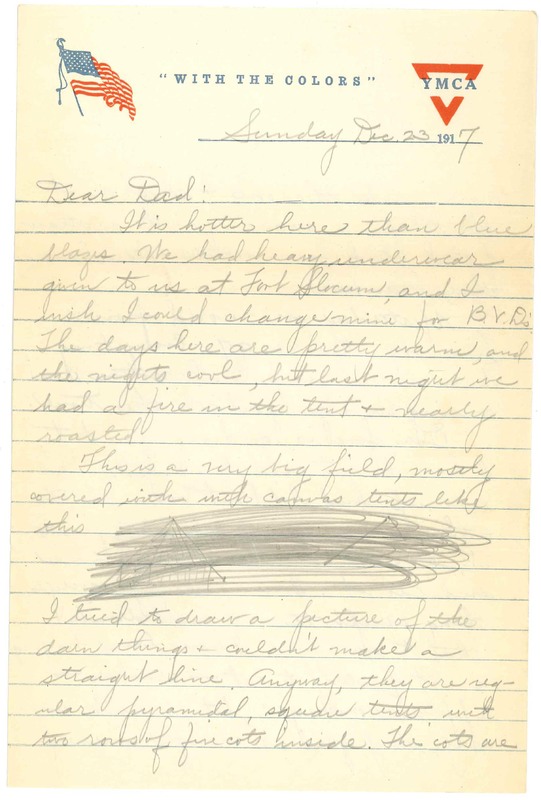The Whipple Letters: Fort Sam Houston in WWI by Patrick Bassett
This exhibit highlights letters written by Percival Whipple from 1917-1919. Percival Whipple was a private in the United States Army who was stationed at Kelly Field, and Fort Sam Houston during World War I. He also spent time at a military hospital in Corpus Christi in 1918. His family was from Hamilton, Massachusetts, and he wrote his mother and father frequently. His letters highlight military life on the home front during WWI, and as a member of the Signal Corps, the closest he got to combat was occasionally guard duty. In fact, in the entirety of his letters, he only references carrying a rifle once, a task he is clearly uncomfortable with. In the letters to his parents he discusses the weather, military bureaucracy, and a quickly growing San Antonio. He was denied an officer’s commission multiple times, due to both misplacement of his service record, and his superiors stonewalling his applications, events that over time sapped his morale and proved a constant aggravation for him.
On June 3, 1916 the United States Congress passed the National Defense Act, which called for the Army to be expanded to 223,000 men and increase the National Guard to 425,000 men. 208,000 of these men were trained in two separate camps (Camps Wilson and Travis) before the end of WWI1. This upsurge in personnel created supply problems, as Whipple, who at varying times served in the supply tents for his company, complained about in his letters. Although admittedly, some of his reservations stemmed from being given an officer’s responsibility without an increase in pay. Additionally, Whipple suffered from measles and various illnesses during his military career and discusses conditions in military hospitals at both Fort Sam Houston, and in Corpus Christi, where he was sent to recover from a particularly long-lasting illness. During the winter of 1918-1919, Fort Sam Houston experienced an outbreak of influenza, and Whipple’s descriptions of military hospitals at the time shed light on conditions in military hospitals shortly before this outbreak2. Whipple’s letters help us understand the effects of increased wartime mobilization on San Antonio, and provide important insight into conditions on Fort Sam Houston during the first World War, providing an important insight for local historians.
[1] Handy, M. Olivia. History of Fort Sam Houston (San Antonio, Nayler, 1951), 74.
[2] Handy, History of Fort Sam Houston, 82.
